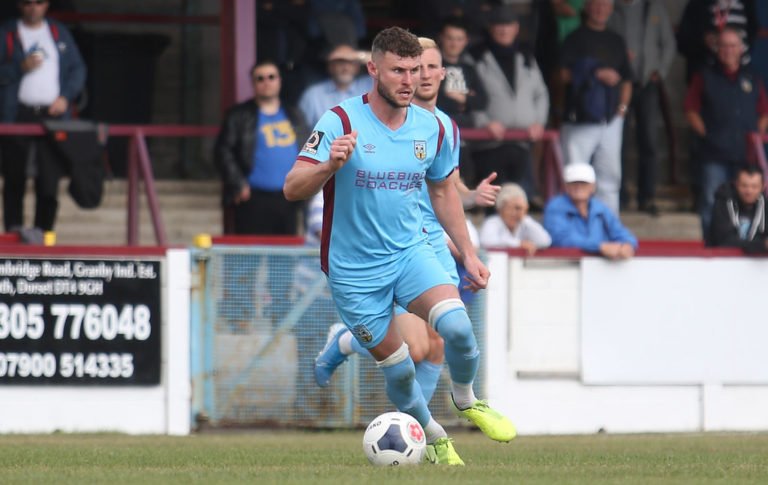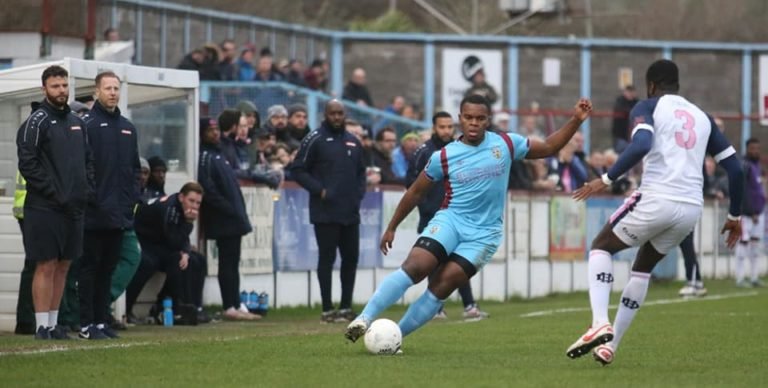“I GAVE the chairman a call from Weymouth and said: ‘look, I’ve got the opportunity to go pro with Plymouth’. He just laughed and said: ‘I’ll see you at pre-season!’”
Weymouth Football Club played a significant role in the career of Team GB sprinter Darren Campbell – Olympic 4x100m relay gold medal winner at Athens 2004.
Yet the Sale-born athlete’s success on the track only came about after calling it quits on the pitch.
In the 1995/96 season, Campbell turned out 27 times for the Terras as a striker, scoring four goals, and was highly sought after for his electric pace combined with a tireless work rate.
Campbell had turned to football aged 21 following an initial journey into athletics that was plagued by injuries.
A move to south Wales and Cwmbran Town followed – and so did the scouts.
“We were playing a game up in Ton Pentre,” Campbell told Echosport.
“After the game a Liverpool scout came in the dressing room and said: ‘look, you’re a decent player. You’re not ready for Liverpool yet, but I can get you trials’.
“I ended up going on trial at Millwall and Plymouth Argyle. I was waiting to see if there was going to be an opportunity to sign with Plymouth, because it had gone really well there.
“Whilst I was waiting, there was an opportunity to go to Weymouth, so I went and met the chairman (Matthew McGowan).
“They offered me decent money – more than I was earning at the time because I was working at an insurance company. I decided to move to Weymouth.”
Campbell’s arrival at what was then called the Wessex Stadium in the summer of 1995 coincided with a famous influx of talent from the North East.
Weymouth had secured the services of David Laws, Ian Hutchinson and John Waldock, while Paul Myers came in from the Midlands.
The legendary quartet would later become known as the ‘Northern Four’ and stayed in McGowan’s hotel on the seafront, along with Campbell.
He would be waited on by another future household name – comedian Alan Carr, son of Weymouth’s boss Graham.
“There were a good five of us who would come down from further afield,” Campbell recalls.
“(Alan) was doing table service in the restaurant, so that was crazy. Look what he’s gone on to achieve.”
However, 24 hours after signing for the Terras, Campbell was hit with a bombshell from new Plymouth boss Neil Warnock.
“I signed for Weymouth on the Wednesday,” Campbell said.
“Then on the Thursday I had a phone call – it was during the summer before pre-season – from Plymouth offering me a two-year contract.
“I was like: ‘oh, I’ve just signed semi-pro with Weymouth’.
(Warnock) was like: ‘look, I’ve never seen you play, so I’m not going to pay any money for you, give Weymouth a call and see if you can get out of the contract’.
“So I gave (McGowan) a call and said: ‘look, I’ve got the opportunity to go pro with Plymouth’. He just laughed and said: ‘I’ll see you at pre-season!’
“There was no way he was going to let me out of the contract!”
Campbell settled in at Weymouth for a spell he enjoyed immensely – including developing a taste for post-match drinks.
“Before embarking on football I’d been in athletics, so it’s a totally different scene,” he said.
“I always remember getting on the team bus after games and all the lads having beers. I never drank beer.
“On the way home from games I was always at the back of the bus, having banter with the boys but in the end they managed to get me drinking beer!
“It just showed the camaraderie we had as a team.
“I really loved my time there, the people were so friendly and everybody was really accommodating.
“It was a good crop of players. We were friends as well as team-mates.”
The future Olympian also competed at Wembley, winning £600 in a sprint race to discover the fastest non-League player.
“It was sad when I left but the thing I was able to do was the sprint competition,” he said.
“The final was at Wembley at half-time of an international game – I think it was England versus Finland.
“I wore the Weymouth shirt and won the competition. That’s really what made me decide I was a much better sprinter than I was a footballer.
“Weymouth were accommodating in allowing me to go back to athletics – because I’d signed a two-year contract.
“Mutually, we came to an agreement and I was able to go back to athletics. Within a couple of months I was selected for the ’96 Olympics.”
Campbell admitted his return to track and field was far from simple.
“It was a step into the unknown – it’s not like I was leaving Weymouth and I had another job,” he said.
“As an athlete you only start earning money if you’re at the top of the sport.
“It was difficult to leave because I love playing football. It was one of those decisions in your life where it was a massive turning point.
“Making the right decision becomes important, but also executing it.
“If I hadn’t have made a success in athletics it would probably have been one I regretted.”
Before winning Olympic relay gold in Greece, Campbell had taken 200m silver at Sydney 2000.
During his career he also claimed three World Championship medals, plus three European golds and two Commonwealth titles.
Campbell’s honours are remarkable – particularly after a difficult childhood set against a humble background and the tragedy of losing a close friend to murder in the ganglands of Manchester.
But in 2018, Campbell suffered a bleed on the brain – a life-threatening situation that prompted him to release his autobiography Track Record this Christmas.
“Just recovering from that was difficult,” Campbell explained.
“Coming into the start of this year, a gentleman who wrote the book (Trystan Bevan) we’d worked together at Wasps.
“He’d always said to me about writing a book and could we do something together. It was his dream to one day write a book.
“I just felt if I was going to write it I’d love to write it with somebody (where) it’s their dream – just like Olympic gold was my dream.
“I felt it was the right time to get everything out of my mind. With what happened in 2018, it could’ve been a situation where I never got the opportunity to write a book.
“I felt blessed to be here and it would’ve been a travesty for my kids not to know where their dad has come from, to achieve the things I’ve achieved.”
From Weymouth to the Olympics and south Wales to Athens, Campbell’s legacy will now be documented forever.




